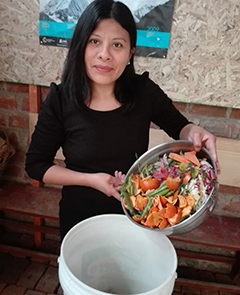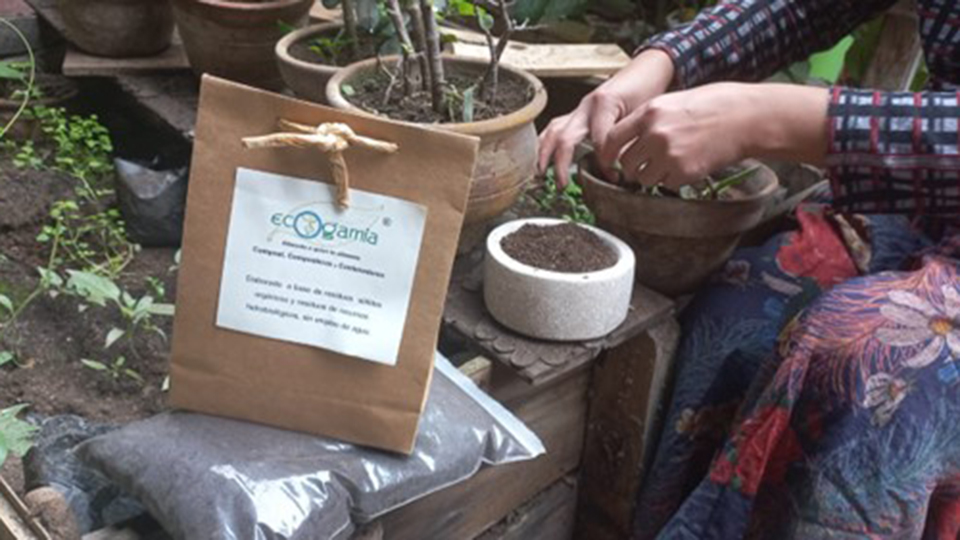

October 8, 2024
Maribel Zamata from Peru began exploring various composting techniques, driven by her belief in the value of organic waste as a resource rather than trash. As her innovation expanded in both scope and potential, she realized the need to protect her intellectual property. In 2023, with the support of WIPO’s Inventor Assistance Program, Maribel secured a patent in Peru for her compost bin, designed to minimize foul odors.

Maribel’s story begins in an unlikely setting: the Peruvian desert. Her childhood was marked by an extraordinary contrast – a green and lush garden nurtured by her parents amid the sandy wasteland. “My parents, especially my mother, loved gardens,” Maribel recalls. This early connection to the environment would become the foundation of her life’s work.
Years later, Maribel moved to Villa el Salvador, a district on the outskirts of Lima, where she met with a starkly different reality. There were no green spaces, and the prospect of raising her child in such an environment was deeply unsettling. “I said to myself that my son could not grow up in these conditions, without being surrounded by green areas, flowers, and nature itself,” she reflects.
Her journey to create a green space in her new home was not without challenges. The sandy soil of Villa el Salvador made gardening difficult, and purchasing soil and compost was financially costly. In a bid to improve her garden’s soil naturally, Maribel began introducing organic waste in her yard. In 2008, while pursuing a master’s degree in environmental education and sustainable development, Maribel learnt about composting and began experimenting with composting techniques.

As Maribel delved deeper into composting, she had to deal with ants, flies, and mosquitoes that plagued her efforts. “I remember noting all these problems, and I would say I had to solve them,” she recalls. Through trial and error, Maribel refined her composting methods, always striving to improve while minimizing the presence of pests. By 2019, after years of experimentation, Maribel had developed a method that effectively managed the insect problem without resorting to pesticides or chemicals.
Maribel realized that the solutions she had developed out of personal necessity had broader applications. “I knew I was also providing a solution to the problem of organic solid waste,” she reflects. Her innovations extended beyond her garden, addressing the challenges faced by others living in similar environments with limited access to green spaces and resources.
One of her inventions was a new type of composter designed to store organic waste for several days without emitting odors or attracting insects. This container could be emptied into the composter once full, making the process more convenient and accessible for daily use.
Maribel also developed a composting method that does not require water, which is an essential innovation in a region where water is a precious resource. This technique was particularly effective for composting fish waste, without attracting flies. Maribel’s solution not only controlled the smell but also turned a challenging waste product into valuable compost, all without harmful chemicals.
As her invention grew in scope and potential, Maribel recognized the importance of protecting her ideas. “Securing IP is crucial for startups and innovation,” she notes. The compost bin which reduces foul odors, invented by Maribel, was granted a patent in Peru in 2023. Maribel has also used a trademark on her firm’s branding “ECOGAMIA”.
Maribel is a beneficiary of WIPO’s Inventor Assistance Program. The program supports inventors and small businesses with limited resources transform their innovation into commercial assets.
She has also penned her composting experiments in a book titled “Cascarita Yo Te Amo” (“Little Peel, I Love You”), which has also been copyrighted. Through her writing, Maribel shares the challenges she faced, the solutions she discovered, and the lessons learned along the way. But beyond the experiments, her story also shows the power of individual action.
Maribel emphasizes the importance of valuing organic waste and recognizing it as a resource rather than trash. “I want everyone to value waste, to see the potential in it,” she says. She is now seeking partners and investors who share her vision of transforming organic waste into a valuable resource. “I believe that organic solid waste can help contribute to improving this planet, not just in terms of climate change but also in improving human nutrition,” Maribel says.
The Inventor Assistance Program supports inventors and small businesses with limited resources transform their innovation into commercial assets. The IAP matches selected beneficiaries with a volunteer patent attorney or agent to help them navigate the patent system at no cost.
WIPO GREEN is a free, solutions oriented, global innovation platform. It connects needs for solving environmental or climate change challenges with their solutions. The database consists of user uploads of needs and solutions, green technology patents from the WIPO Patentscope database, imports from select partner organizations, relevant knowledge material, and relevant expert profiles. Through its database, network and acceleration projects, WIPO GREEN brings together key players to catalyze green technology innovation and diffusion.